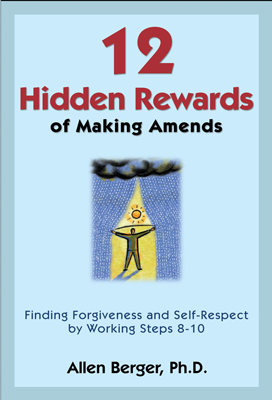The 12 Gifts from Working the Steps
An excerpt from
An Abridged Version of 12 Hidden Rewards of Making Amends
by Allen Berger, PhD., Hazelden Publishing
PART ONE | The Twelve Steps Help Us Build a Design for Living That Leads to A Deep Sense of Well-Being, Serenity and Peace of Mind
The Twelve Steps of Alcoholics Anonymous have been heralded as the most important spiritual development of the past 100 years (Rohr 2011). It is my opinion that they should also be considered one of the most innovative psychological interventions of the past century. As evidence, consider the fact that the Twelve Steps have had more success in treating a wide variety of addiction problems than all other medical or psychological intervention or treatment programs combined (Schenker 2009).
What are the therapeutic forces that enable the Twelve Steps to help so many people who are struggling to reclaim their lives? My conclusion is that the Twelve Steps help us recover our lost true-self. They provide a framework that helps us work out a new understanding of ourselves, and that teaches us a design for living that encourages authenticity and responsibility. This new design leads to a deep sense of well- being, serenity, and peace of mind.
Abraham Maslow made the following observations about the importance of a basic need like self-actualization:
• The absence of self-actualization breeds illness.
• The presence of our true-self prevents illness
• The restoration of the true-self cures illness.

The first three Steps help us demolish the foundation on which we built a life that ultimately led to our demise. They give us hope that a better life is possible.
It’s a spiritual axiom that the more we try to control our lives, the more we lose control. This is at the heart of Step 1: we are being asked to admit our powerlessness. Bill Wilson described it when he wrote, “Every natural instinct cries out against the idea of personal powerlessness” (Twelve Steps and Twelve Traditions). For us, control is essential to our well-being, even though in reality the opposite is true.
Recovery begins when the personal myth of control is shattered. We give up controlling our lives and stop trying to control others; we stop trying to control our drinking or drug use or whatever we are trying to control. We accept and surrender to the reality that we are out of control. This is the crack in our cosmic egg that begins the deconstruction of our false-self. Bill Wilson described this process as “deflation at depth.” It has also been referred to as “hitting bottom” (Tiebout 1999).
When we surrender, our reliance on our false-self is weakened. This is critical to the foundation of our recovery, and it is what is meant in the line “little good can come to any alcoholic who joins A.A. unless he has first accepted his devastating weakness and all its consequences” (Twelve Steps and Twelve Traditions).


[…] PART ONE PART TWO PART THREE PART FOUR […]
[…] PART ONE PART TWO PART THREE PART FIVE […]
[…] PART ONE PART TWO PART FOUR PART FIVE […]
[…] PART ONE PART THREE PART FOUR PART FIVE […]